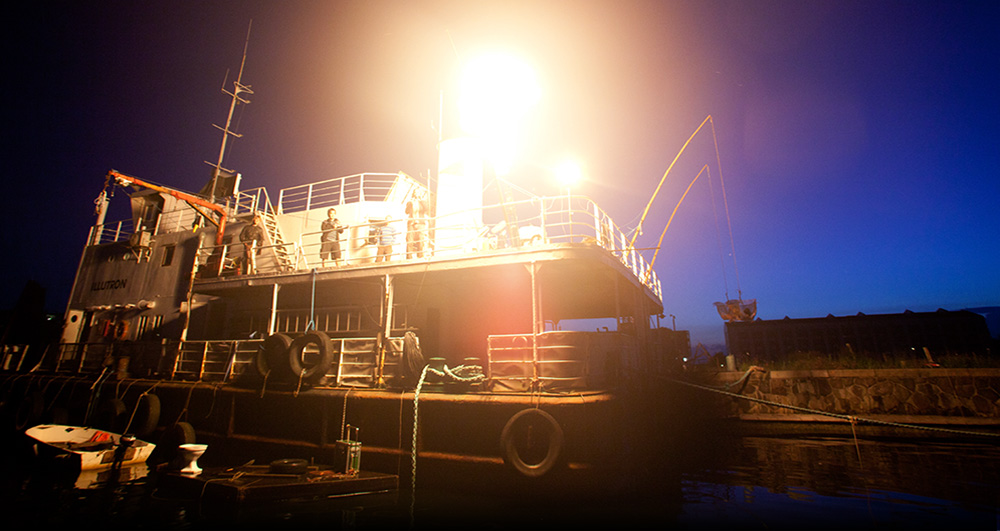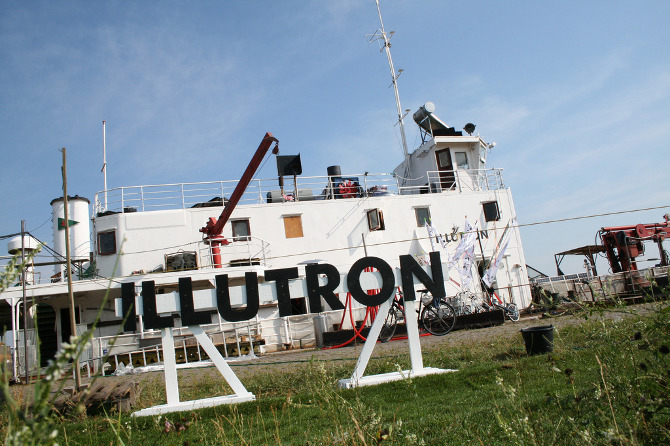New Instruments in New Spaces
For the next Frankenstein’s Lab, curated by Lars Kynde, we will be moving out to Illutron for an on-site peek into the workshop of four instrument inventors who will be sharing their thoughts and give us a demonstration of some of their latest projects.

The inventor stands in an interesting field between past and future possibilities. Sandra Boss, Christian Liljedahl, Tobias Lukassen and Harald Viuff will each give their take on building instruments which on the one hand point to the future and open up new musical possibilities, and on the other hand grow out of the technological possibilities that are already available today.
They are all artists who are not content to express themselves through an existing medium – creation and innovation in the medium itself are for them an important part of the creative process.
Sandra Boss often works with site-specific organ pieces that play with the organ’s interference tones in relation to the room they are presented in. This time round she will be presenting a smaller organ which she has had built specially for her acoustic investigations. It is controlled electronically, which allows for new sound possibilities, as well as being mobile and thus (unlike traditional church organs) not tied to the acoustic of a particular place.
Harald Viuff will be presenting his AmbiUnix Sound system. Here the focus is on the spatial manipulation of sound as it passes between the loudspeakers that surround the audience. The system opens up the possibility of playing with the spatial parameters of sound such as direction, elevation, rotation, point and width as well as using various filters in order to play with our perception of the placement and direction of sound in the room.
Christian Liljedahl and Tobias Lukassen have in the past few years created a whole range of spectacular instruments that have their point of departure in hacked machines and the readily available technologies that surround them. A number of them work by setting air, strings or other materials in vibration through electronic feedback-resonance. They will be presenting a number of the latest ‘work-in-progress’ ideas they have been working on together.
I (Lars Kynde) will be your host for the evening and at the same time a link between Illutron and the Danish Composers’ Society since I am a member of both groups. Since moving back (after a number of years in Holland) to Denmark last year with a strengthened interest in self-made media and newly created instruments, I have been on the lookout for those working in this field in Denmark. There is a great deal of interest across the boundaries of various disciplines for exactly this.
Amongst artists, interaction designers, composers, engineers, electronic musicians and architects, individuals have independently of each other developed not only an interest for new musical instruments but also a philosophy, an aesthetic, and a way of working that is in many ways similar. I was nevertheless surprised that even though Denmark is quite a small country and the topic itself quite narrow, people don’t know each other outside their own artistic discipline – composers know composers, designers know designers, and so on. I hope that with this get-together as well as future Frankenstein’s Labs “away from home” that we will come a step closer to getting to know each other.

The Illutron Lab will take place on Tuesday the 28th of April.
The evening will start off with an introductory tour of the Illutron studio at 19:30. Doors will be open from 19:00 and the presentations will begin at 20:00.
Good directions on how to get to the Illutron barge are available on their website.
Looking forward to seeing you there.
Illutron is a collaborative interactive arts studio. Illutron creates large scale interactive art, intriguing explorations into the realm where art and technology meet, experiments in the water and is a place for individual or collaborative work.
The Illutron studio was formed in 2007 by a group of people with a wide range of backgrounds: artists, performers, programmers, electricians, musicians and electronics wizards. The group started with two primary values: to create a community around creative, artistic usage of technology, and to build an open platform where people could explore driven by their own curiosity.
MIT Press has just released a book: Making Futures: Marginal Notes on Innovation, Design, and Democracy which features a chapter (available for free download) on Illutron.
-
← Frankenstein and the Dome of Visions
Frankenstein’s Lab is back, this time in the wonderful …
-
The word ‘opera’ evokes visions of celebrated singers …
